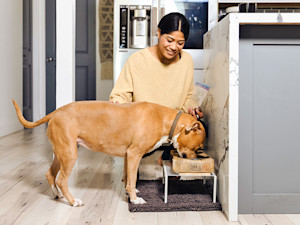Are Scrambled Eggs Good for Dogs?
You know they want to dig in on your breakfast.

Share Article
In This Article:
Can Dogs Eat Scrambled Eggs? Health Benefits of Eggs for Dogs How to Prepare Scrambled Eggs for Your Dog How Often Can Dogs Eat Scrambled Eggs? Signs That Your Dog Is Allergic Frequently Asked Questions
Pet parents like to share whatever they’re eating with their pets. It’s hard to resist those big, beautiful, and begging eyes. However, is it safe to give your dog a bite of everything you eat? You need to be sure, because many human foods are not suitable for your pup, and can even be downright dangerous. In this article, we’re going to look at scrambled eggs.
Can dogs eat scrambled eggs?
With certain precautions, scrambled eggs can be very nutritious f or your dog. They should be plain, fully cooked, and given only occasionally. Why are they nutritious? Eggs provide highly digestible protein, essential amino acids, and a range of healthy vitamins and minerals. To keep them plain, avoid added fats, salts, and seasonings. Again, they should only comprise 10 percent or less of your dog’s daily calories.

Health benefits of eggs for dogs
Let’s get into a little more detail about the nutritious elements of scrambled eggs for dogs:
High-quality protein: Eggs support muscle maintenance by providing complete amino acids. They also aid in tissue repair and immune function.
Healthy fats: Energy and absorption of fat-soluble vitamins are helped by the fats contained in the yolk.
Vitamins and minerals: Eggs supply vitamin A, several B vitamins, selenium, and choline. These nutrients are essential for maintaining skin/coat health, supporting nerve function, and regulating metabolism.
Palatability: Dogs generally find eggs tasty, so if you have a picky eater, a little egg added to their regular meal can make it more enticing.
Easy on the stomach (for many dogs): If your dog has experienced a short bout of upset stomach, plain egg is often a good option to reintroduce food.
Keep in mind that one large egg has 60 to 80 calories, around six grams of protein, and about five grams of fat. Those calories add up quickly on small dogs or dogs watching their weight.
How to prepare scrambled eggs for your dog
Cook thoroughly: Scramble on low heat until the egg is fully cooked.
Skip added fats: Do not use butter, bacon grease, or oil.
Keep it plain: No salt, pepper, dairy, or herbs.
Portion smartly: Add the scrambled egg to your dog’s regular meal so you can easily adjust total calories.
Quick portion guide (as a topper, respecting the 10%-calorie rule):
Toy (≤10 lb): 1–2 tablespoons (about ¼ egg)
Small (11–20 lb): ¼–½ egg
Medium (21–50 lb): ½–1 egg
Large (51–80 lb): 1 egg
Giant (>80 lb): 1–2 eggs
Always feed less than noted to dogs prone to pancreatitis, sensitive stomachs, or weight problems.
Ingredients you should not add to your dog’s scrambled eggs
Onions, garlic, chives, and leeks: Do not give pups any of these. They damage red blood cells.
Salt and salty meats (such as bacon and ham): These contain excessive sodium and fat.
Butter, oils, cream, milk, cheese: You should avoid cream, milk, cheese, and butter because some dogs are lactose-sensitive. Additionally, excessive fat can trigger gastrointestinal upset or pancreatitis.
Spices and pepper: Can irritate the GI tract.
Artificial sweeteners (especially xylitol): Toxic to dogs.
How often can dogs eat scrambled eggs?
Dogs with a history of pancreatitis, chronic GI disease, kidney disease, or obesity should not be given scrambled eggs unless you first consult with your veterinarian. Eggs given as treats should be ≤10 percent of daily calories. For many dogs, that translates to eggs one to three times per week in small amounts.
Signs that your dog is allergic or having a bad reaction to eggs
Reactions to food can occur immediately after eating or develop over time. Watch for:
GI signs: Vomiting, diarrhea, gas, abdominal discomfort, or decreased appetite
Skin/ear signs: Itching, face rubbing, red skin, hot spots, recurrent ear infections
Acute reactions: Hives, facial swelling, sudden lethargy (if your dog has trouble breathing, go to the veterinarian right away.
If any of these symptoms appear, stop feeding the eggs immediately and consult with your vet.
Alternatives to scrambled eggs for dogs
If your dog doesn’t have a problem with eggs, they don’t have to be scrambled. They can be boiled or poached eggs (plain): These have the same benefits.
Lean proteins such as plain boiled chicken or turkey breast
Commercial meal toppers, if they are single-ingredient freeze-dried meats or veterinary-formulated toppers.
Omega-3-rich fish such as plain sardines (in water, unsalted) or salmon, cooked well and deboned.
Carb-gentle options: Plain canned pumpkin (not pie filling) or cooked white rice.
Do not replace your dog’s main meal with alternatives. Offer them as a treat.
Bottom line
Yes — when prepared plain and fed in moderation. Scrambled eggs are a high-value treat or food topper if appropriately prepared and not given to dogs with pancreatitis, kidney disease, or on special diets.
Keep portions small, cook them thoroughly, avoid added fats and seasonings, and factor the calories into your dog’s daily intake. When in doubt, consult your veterinarian.
FAQs
Can puppies eat scrambled eggs?
Yes, in tiny amounts and only as a complement to a complete, balanced puppy diet.
Is scrambled egg good for dogs with diarrhea?
Sometimes. If the dog is bright and well-hydrated, plain and fully-cooked eggs can be part of a bland diet for diarrhea. However, they are not suitable for dogs with a history of pancreatitis, blood in the stool, lethargy, vomiting, or a prolonged period of diarrhea. Call your veterinarian.
Can dogs eat eggshells?
Feeding shells is not recommended. A whole shell or pieces can be sharp, and may add too much calcium to the diet.
Can dogs eat raw eggs?
Raw eggs are generally not recommended. They carry bacteria such as Salmonella, which can harm both dogs and people. If you’re considering raw feeding, discuss safe, balanced formulations with your veterinarian.
References
Davies, R. H., et al. “Raw Diets for Dogs and Cats: A Review, with Particular Reference to Microbiological Hazards.”opens in new tab Journal of Small Animal Practice, vol. 60, no. 6, 26 Apr. 2019, pp. 329–339.
Kienzle, Ellen, et al. “A Comparison of the Feeding Behavior and the Human–Animal Relationship in Owners of Normal and Obese Dogs.” opens in new tabThe Journal of Nutrition, vol. 128, no. 12, 1 Dec. 1998, pp. 2779S2782S, Accessed 13 July 2019.
Luño, Isabel, et al. “Emotional Eating in Companion Dogs: Owners’ Perception and Relation with Feeding Habits, Eating Behavior, and Emotional State.” opens in new tabJournal of Veterinary Behavior, vol. 25, May 2018, pp. 17–23.

Dr. Shelby Neely, DVM
Dr. Shelby Neely is a freelance writer and veterinarian who graduated from the University of Pennsylvania School of Veterinary Medicine and has practiced veterinary medicine for 30 years, specializing in small animals. Her work has appeared in Allivet, AsktheCatDoctor, WhiskerDocs, Ask the Cat Doctor Radio, Ask the Cat Doctor TV, and numerous other websites, brochures, newsletters, newspapers, and ebooks. In her spare time, Dr. Neely likes to spend time with her three children, two grandchildren, three cats, two grand-cats, and five grand-dogs.
Related articles
![Feeding raw salmon or sashimi to young French bulldog]()
10 Healthy “People” Foods for Dogs
You might be surprised that these common health foods are totally safe for pups.
![pet parents making homemade dog food cheaper for black dog climbing on counter]()
Is Cooking Your Dog’s Food Worth it?
A nutritionist on dogs’ unique dietary needs, important ingredients, and other pro tips for home-cooked dog food.
Can Dogs Eat Cashews?
They’re not toxic, but you don’t wanna overdo it.
Can Dogs Eat Raw Chicken?
They’re definitely curious about what you’re chopping over there on the cutting board...
![Woman feeding her large brown dog at home.]()
What to Feed a Dog With Vestibular Disease
Healthy meals and supplements can help set them on a path to recovery.







